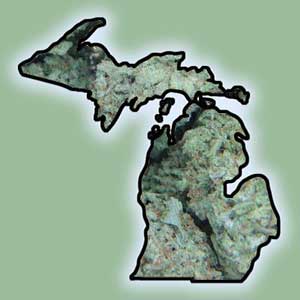 The issue in Ter Beek v Wyoming is nothing short of the future of Michigan’s medical marijuana law
The issue in Ter Beek v Wyoming is nothing short of the future of Michigan’s medical marijuana law
LANSING- Less than 24 hours ago the Supreme Court of Michigan announced they would hear oral arguments in the case of Ter Beek v Wyoming. Attorney John Ter Beek sued the city he lives in over an ordinance restricting the use and possession of medical marijuana, which is in contradiction with the Michigan Medical Marihuana Act (MMA).
That state law stands in contradiction to federal law and the Controlled Substances Act (CSA). Wyoming, Michigan’s ordinance cited federal law in banning activities related to the medical use of marijuana, and this federal preemption is one of the issues the MSC is debating.
Ter Beek won his case in the Court of Appeals in a ruling that stated cities cannot use federal law as a justification to ignore state law. Wyoming has appealed the case to the Supreme Court. Briefs in the case have been filed by the ACLU of Michigan, the Ter Beek legal team, and several others.
Testimony in the form of oral arguments will be heard on Thursday, October 10. This week is the start of the Court’s new session; they have until July 31, 2014 to deliver a ruling on the case.
Oral arguments will broadcast live via the MSC website. The Clerk of the Supreme Court’s office confirmed that live coverage will be available on the MSC website. An Information officer informed TCC that the video of the sessions would be available on the State Bar Association’s website in the Archives area. Her estimate was that the video would be loaded and available for viewing late this week at the earliest, but probably not that soon.
After the COA decision, Wyoming appealed to the Supreme Court to reach the final verdict. In agreeing to hear the case, the MSC stated they would evaluate more than just the issues previously litigated, turning this single case into an evaluation of the medical marijuana law’s fitness to exist in contradiction to the CSA. “In agreeing to hear the case, the State Supreme Court has asked attorneys to focus on whether the state law is preempted by federal law and whether the city ordinance violates the state law,” reported Barton Dieters of the MLive group.
Michigan is one of 20 states that have adopted laws that contradict federal law by allowing citizens to use a Schedule 1 controlled substance- marijuana- for medicinal reasons. Although many in the state believe that the MSC cannot discard the state’s Voter Directed Initiative of 2008, they could make a ruling that effectively does the same thing by allowing communities to ban the activities allowed under the MMA.
Wyoming is a suburb of Michigan’s second-largest city, Grand Rapids. During the November 2012 election, voters elected to decriminalize the possession and use of marijuana in Grand Rapids- one of five cities that voted to relax marijuana restrictions during that voting period. The contradiction between the values shown in neighboring communities persists as a stumbling block to successful adoption of Michigan’s wildly successful medical marijuana program.
Wildly successful is an understatement. The 2008 vote was won by a 63% vote of the electorate, a margin which has been described as a “landslide” victory in other cases by Michigan’s Attorney General. Wyoming’s voters approved the MMA by a 59% vote. The five victories in 2012-s local elections gives Michigan a perfect record of 11-0 in votes where marijuana laws were offered to the people. Michigan’s 130,000 registered medical marijuana patients- and the approx. 30,000 people registered to legally cultivate marijuana plants in their homes- represents nearly 2% of the entire adult population of the state.
Although opponents of the MMA cite these numbers as proof that the system is out of control, figures provided from Michigan’s Department of Health reveal that 27% of Michigan households have a member that suffers from chronic pain issues.
The Supreme Court is allowed to provide notice of hearings a mere 18 hours before they are convened. News outlet MLive announced the session at 10:22 this morning, literally after the session’s 9:30 start time.
Arguments by Ter Beek’s attorney, ACLU of Michigan’s Daniel Korobkin, and Wyoming’s city attorney Jack Sluiter will be delivered on Thursday, Oct. 10. Other briefs filed in support of Ter Beek include national powerhouse The Cato Institute and a Michigan legal firm; briefs filed in support of Wyoming’s prohibition include the city of Livonia, the Prosecuting Attorney’s Association and the Michigan Municipal League.
The live broadcast of oral arguments to the Court can be viewed at:
courts.mi.gov/Courts/MichiganSupremeCourt/oral-arguments/live-streaming/Pages/live-streaming.aspx
Source: The Compassion Chronicles







